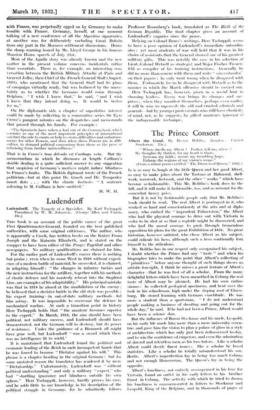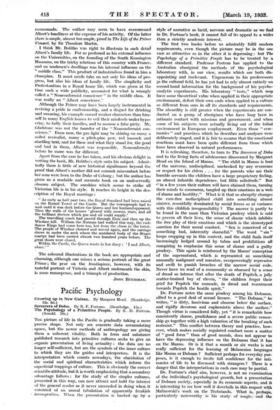The Prince Consort
Albert the Good. By I lect or Belk Lon: tot : Cobden
Si' indorse], 25s.) " Whem dwells my Albert I Father, toll ale, when: ?
My thoughts fly thither, for my heart is them. Increase my faith ; assure my trembling hope, Enlarge the regions of my Vii31011e8 scope." - (From a minor poem entitled " The Distressed Queen," .1862.)
Jr is so easy to laugh at the little Queen and her got. Id Albert, so easy to snake jokes about the Tartans at Balmoral, shell- work, waxwork, fretwork, and the of her " works " which have become so fashionable. 'M. Mr. liolitho's book does to the full, and it will make it fisshionable, ti)4), and SO amount for the somewhat heavy price.
But it is not by fashionable people only that Mr. B01itho's book should be read. The real Albert is portrayed in it, wlao worked so hard and conscientiously at the arts and at diplo- macy, who curbed the "imprudent Palmerston," the Albert who had the physical courage to drive out with Victoria in order to be shut at so that a regicide might be discovered, and who had the moral mirage to posh through tremendous imposition his plans fir the great Exhibit ion of 1851. No great historian, however satirical, who chose Albert as Isis subject, could ridicule his lass), although such a hero continually lent himself to the ridiculous.
Mr. Bolitho has in one respect only overpraised his subject. I doubt whether the Prince had any " taste " and when his biographer tries to make the point that Albert's collecting of " primitives " before anyone thought of such things shows au artistic foresight, I think he misses a great feature of Albert's character—that he was first of all- a scholar. From tine many delightful letters which have been unearthed in Coburg the real taste of Albert may be gleaned. Ile had Isis own enthu- siasms: he collected geological specimens, and bent over the tusk in his schoolroom, high under the sloping roof of Men- burg., He stored learning with German exactitude. Ile was more it student than a sportsman. " 1 110 not understauuI people making a business of shooting and going out for the whole day," he said. If lie had not been a Prince, Albert woulit have been n science don.
But the influence of Ilumn St ockinar and hit Wale, Leopold, on his early life made him more than a mere university eccen- tric, and gave l the vision to plan in palace of glass in as style of archittsture which has only just been rediscovered to-day, and to win the confidence of empenIrs, and even the admiration of shrewd and relentless nsen, as his two tutors. Like a scholar Albert could decide finest issues ; like a scholar he loved statistics. Like a scholar he totally misunderstood his sou, Bertic. Albert's imperfection lay in being too much Coburg and not enough Ihmoverian. The Queen's lay in being the opposite. Albert's lonelines, not entirely recompensed in his love fin! Victoria, found an outlet in Iris early letters to his brother Ernst in Coining. The activity with which he tried to drown Isis loneliness is commemorated in letters to Stoekmar and Leopold, King of the Belgians, and in thousands of pages of
memoranda. The author may seem to have overstressed Albert's loneliness at the expense of his activity. Of the latter there is ample, almost too ample, proof in The Life of the Prince 'Consort, by Sir Theodore Martin. I think Mr. Bolitho was right to illustrate in such detail Albert's family life. For as profound as his external influence on the Universities, on the founding of the South Kensington Museums, on the tricky relations of this country with France, and on workmen's dwellings was his internal influence on the " middle class." This product of industrialism found in him a champion. It must needs take on not only his ideas of pro- gress, but also his ideas of family life. The simplicity and Protestantism in a Royal home life, which was given at the time such a wide publicity, accounted for what is wrongly called a " Nonconformist conscience " in the middle class. It was really an " Albert conscience."
Although the Prince may have been largely instnunental in reviving a pride in craftsmanship, and a disgust for drinking and swearing, his example caused weaker characters than him- self in many English homes to veil their misdeeds under hypo- crisy, to bully their families, and to assume a false piety. Mr. Gladstone was not the founder of the " Nonconformist con- science," Even now, the gas light-may be shining on many a soiled revivalist, many a pitch-pine pew, red hassock and startling text,- and for these and what they stand for, the good and bad in them, Albert was responsible. Nonconformity before he came was far different.
Apart from the care he has taken, and his obvious delight in writing the book, Mr. Bolitho's style suits his subject. Admit- tedly there is little of new historical significance beyond the proof that Albert's mother did not commit misconduct before her sons were born to the Duke of Coburg ; but the author has given us a readable and accurate book on an undeservedly obscure subject. The sunshine which seems to strike all Victorian life is in his style. It reaches its height in the des- cription of the Royal marriage :
" As early as half past two, the Royal Standard had been raised on the Round Tower of the Castle. But the townspeople had to wait until it was dark before the Queen and her husband appeared. Then the walls of the houses ' glowed with crowns, stars, and all the brilliant devices which gas and oil could supply.' The travelling coach had passed through Eton and then up the Windsor hill. William the Norman had walked this way, the rude Saxon Kings had come here too, hot from the chase in the forest. The people of Windsor cheered and waved again, and the carriage drove in under the arch where the mutilated body of the Stuart martyr had been carried almost two hundred years before. Tho great doors were closed.
Within the Castle, tho Queen wrote in her diary : ' I and Albert, alone.' "
The coloured illustrations in the book arc appropriate and charming, although one misses a serious portrait of the great Prince ; the pear on the frontispiece, however, with its tasteful portrait of Victoria and Albert underneath the skin, is some recompense, and a triumph of production.
JOHN BEr.nrmax.







































 Previous page
Previous page